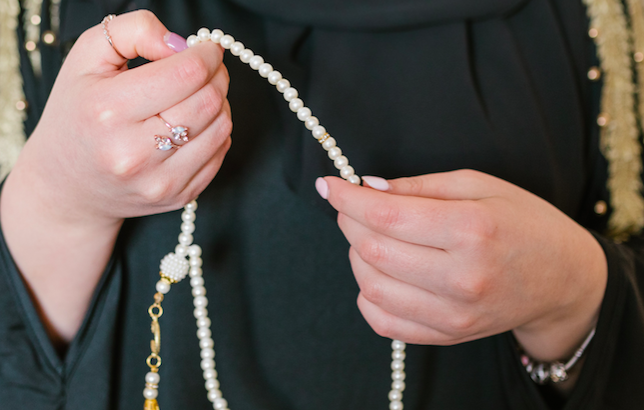English teacher, and mother of two, Sabina Webster, explains how her changing identities of daughter, mother and teacher have influenced her experience of Ramadan.
For as long as I can remember I had been the worst at getting up for Sehri (or Suhoor –the pre-dawn meal eaten before Fajr prayer). I’d get called numerous times from the bottom of the stairs and told that time was running out and it was time to ‘close my fast’. I’d often wonder how my mum was able to wake up so easily and cook for us.
I wasn’t very good at handling the broken sleep… and then I had kids. Now I totally understood. I don’t think I’ve had a full night’s sleep in 5 years.
The feeling of extreme exhaustion during Ramadan, knowing that it is just for a short period of time, is very similar to the start of motherhood. You know that what you are doing is for a good cause. For me, the sacrifice you make by not eating during the hours of daylight is very similar to the sacrifices we make as parents for the needs of our children.
The Ramadan after having my first child – my daughter, was a real opportunity for learning about my religion as a parent. Fasting isn’t mandatory for a pregnant or breastfeeding woman and knowing this removed any feeling of guilt I had about not being able to fast. You can either make up your fasts at a later date or pay Fidya (feed the poor for every day of Ramadan that is missed). It’s so important to have the information so you can do what is right for you and your baby. I was able to do what was right for me and my family when I had my second child too.
Working in a predominantly Muslim school has taught me so much over the years. The young people I teach are fasting, not because they have to or because they are forced to in any way; they do it because they want to. They do it because it is an important part of their faith. I felt the same growing up. Ramadan is the most important month in the Islamic calendar and an opportunity to reconnect with your faith.
Don’t get me wrong, it is hard work, especially when Ramadan has fallen in the summer months and the days are so incredibly long. But there is so much fun to be had and memories to be made. You wake up and eat with your family in the middle of the night; there is often a nap at some point in the day just to pass the time and then the excitement of iftaar, when it’s time to break your fast. Everyone always thinks they’ll eat loads but it’s never the case. These are the memories I hope to pass on to my own children one day.
My children are 5 and 3 and full of questions. I teach them about Ramadan and instead of fasting a full day – which is currently over 16 hours long – they keep mini fasts throughout the day. They get involved when they can at the weekends and share in the treats and foods of Ramadan. My daughter calls dates ‘giant raisins’ and my son likes fried food all year round.
The broken sleep is inevitable as a parent and for now I’m grateful for my son sneaking into our bed at 3am, as he’s the perfect Ramadan alarm clock.

Recent Comments